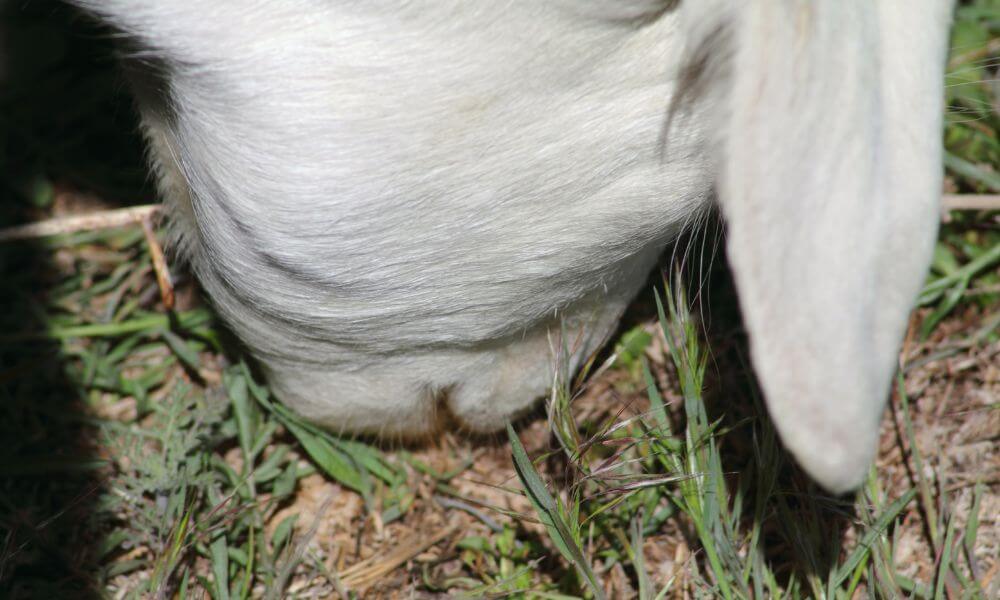Bottle jaw can be very uncomfortable for the goat, so it’s good to be able to notice the signs and move quickly to treat it.
If you’ve never dealt with it before, it may still be a good idea to consult a vet about it, even though it can often be treated with generic medications.
There may be more going on.
Let’s look further into this.

What are the symptoms of bottle jaw in goats?
Bottle jaw itself is quite easy to recognize.
You will first notice it as a swelling on the underside of the jaw.
It often doesn’t look that bad—like a slight inflammation of the loose tissue on the jaw.
It will look rounded and bulbous, and will be tender to the touch.
Your goat may recoil in discomfort if you touch it.
It will first manifest as a pendulous swelling under the jaw.
This will be how you know your goat has bottle jaw.
There may be other symptoms associated, though.
As I said, there could be any number of parasites causing the problem, and the symptoms of this will be things like diarrhea, weight loss, and a general failure to thrive.
So, you could notice other symptoms before the bottle jaw itself begins to manifest.
Look out for any signs that your goat has a parasite, and you could prevent the bottle jaw before it actually occurs.
If you’re too late and it does have bottle jaw, though, let’s look at how to treat it.
How do you treat bottle jaw in goats?
My first piece of advice would always be to speak to a vet as soon as you can.
Bottle jaw is generally nothing to worry about and can be easily addressed, but even as experienced as you are as a goat owner, you could always be wrong about medical details.
What the vet will most likely prescribe, though, is the following treatment.
You will want to start by treating it with a contact remedy, such as Prodose Red.
This is an internal parasiticide, which will work to rid the goat of the parasite that is most likely causing the issue.
After ten days, if the symptoms persist, then repeat the parasiticide treatment.
Continue with systemic remedies ten days after this, and you should get rid of the problem.
Again, though, if at any stage the problem seems to be worsening, or at least showing no signs of improving, you should speak to a vet.
They will be able to offer specialized treatment and diagnosis, and give you the peace of mind that your goat is going to be okay.
As we’ve said, a common cause of bottle jaw is parasites.
Let’s look at which ones.
What parasites cause bottle jaw in goats?
There are two main parasites which cause this infection and swelling of the jaw.
One is the barberpole worm, known by its scientific name as haemonchus contortus.
This is one of the most common parasites affecting goats, which can also cause anemia as it feeds on blood.
This is usually in severe cases, though.
You can typically see the signs of this kind of infection early by the goat’s behavior.
They will eat excessively, be weak and lethargic, and may have some blood in their stool.
If you’ve no experience with these kinds of infections, then, again, I implore you to consult a vet.
It’s always best to be sure about what you’re goat is going through before moving to treatment.
What else causes bottle jaw?
But pole worms are not the only cause of bottle jaw.
In general, bottle jaw is caused by low protein in the goat’s body.
This is, for obvious reasons, a common symptom of pole worm infection.
However, it can also be diet related.
Your goat may not be getting enough protein in its diet, depending on its size.
This can cause the jaw to swell and become uncomfortable.
Again, the only way you can know for sure is to consult with a vet.
They will be able to tell you if there is a parasite or not.
Typically, bottle jaw is really nothing to worry about and can be treated quite simply.
That said, it’s also really important that you take it seriously and move to correct it as soon as you can.
If you don’t, it could in itself get worse and become more and more uncomfortable for the goat.
It could also be the case that there is something worse under the surface that is causing it, that needs to be addressed.
Speak to a vet if you are at all unsure.
